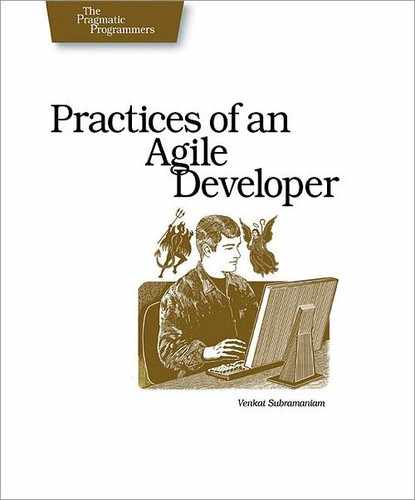 41
Be a Mentor
41
Be a Mentor
“It took you a long time and a lot of hard work to get where you are. Keep it to yourself so you look better. Use your superior skills to intimidate your teammates.” |
|
There may come a time when you realize that you know more about some particular subject than others in your team. What can you do with this newfound authority? Well, you could use it to criticize others, making fun of decisions they make and code they write—we’ve certainly seen folks who do just that. Alternatively, you could share what you know, making those around you better.
“And no matter how many people share it, the idea is not diminished. When I hear your idea, I gain knowledge without diminishing anything of yours. In the same way, if you use your candle to light mine, I get light without darkening you. Like fire, ideas can encompass the globe without lessening their density.”[39]
Working with others on a team is a great learning experience. Knowledge has several unique properties; if you give someone money, for instance, you end up with less and they end up with more. But if you educate someone, both of you gain more knowledge.
By taking the time to explain what you know, you get a better understanding of it yourself. You also get a different perspective when someone asks you questions. You might find yourself picking up a few new tips and tricks—you may hear yourself say, “I hadn’t thought about it that way before.”
By engaging with others, you motivate them to better themselves, which improves the overall competence of your team. And questions that you can’t answer point out areas where you may not be as strong—where you need to focus further in order to improve. A good mentor takes notes while offering advice to others. You’ll stop to jot down topics you want to spend more time looking at or thinking about. Add these notes to your daylog (see Keep a Solutions Log).
Being a mentor doesn’t mean you spend all your time holding team members’ hands and spoon-feeding them information (see Allow People to Figure It Out). It doesn’t mean you have to lecture at a white board or give quizzes. You might decide to present at a brown-bag lunch, but mostly being a mentor means helping your fellow teammates improve their game as well as helping yourself.
And you don’t have to stop at the borders of your team. Start a personal blog, and post something code or technology related on it. It doesn’t have to be an epic work; even a small code snippet and explanation might be useful to someone.
Being a mentor means sharing—not hoarding—what you know. It means taking an interest in seeing others learn and develop and adding increasing value to the team. It’s all about building up your teammates and yourself, not about tearing down.
Unfortunately, it seems to be part of human nature to struggle up the ladder and then look down on others with disdain. Perhaps without even realizing it, it’s easy to create a communication barrier. Others in the team either may begin to fear you or may be too embarrassed to approach you with questions. Then there’s no exchange of knowledge. Being such an expert is like having great wealth and not having the health to enjoy it. You want to be a mentor, not a tormenter.
|
|
Be a mentor. There’s fun in sharing what you know—you gain as you give. You motivate others to achieve better results. You improve the overall competence of your team. |
What It Feels Like
You find that teaching is another way to improve your own learning, and others come to trust that you can help them.
Keeping Your Balance
-
If you keep teaching the same topics over and over to different people, keep notes to write an article or a book about the subject.
-
Being a mentor is a great way to invest in your team (see Invest in Your Team).
-
Pair programming (see Review Code) is a natural environment for effective mentoring.
-
If you find yourself getting interrupted by people who seem too lazy to find the answer for themselves, see Allow People to Figure It Out.
-
Set a time limit for how long anyone on the team can be stuck on a problem before asking for help. One hour seems to be a pretty good target.
